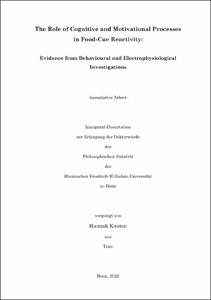The Role of Cognitive and Motivational Processes in Food-Cue ReactivityEvidence from Behavioural and Electrophysiological Investigations

The Role of Cognitive and Motivational Processes in Food-Cue Reactivity
Evidence from Behavioural and Electrophysiological Investigations

| dc.contributor.advisor | Gibbons, Henning | |
| dc.contributor.author | Kirsten, Hannah | |
| dc.date.accessioned | 2022-10-14T15:06:12Z | |
| dc.date.available | 2022-10-14T15:06:12Z | |
| dc.date.issued | 14.10.2022 | |
| dc.identifier.uri | https://hdl.handle.net/20.500.11811/10365 | |
| dc.description.abstract | Overeating triggered by food cues is assumed to contribute to the rising numbers of overweight and obesity in obesogenic environments. Thus, food-cue reactivity has become a growing research topic. This thesis aims to contribute to a deeper understanding of cognitive and motivational processes involved in food-cue reactivity. In four studies, attentional, motivational, and learning processes in the context of food-cue processing and food choices were investigated. In Study I, food-elicited modulations of the attentional blink have revealed evidence for prioritised attentional processing of food cues. In Study II, event-related potentials (ERPs) of emotion-induced blindness elicited by food cues have indicated early attentional capture by task-irrelevant food stimuli. Further ERP evidence in Study III has shown that sustained attention towards food cues is affected by the food’s calorie content and by the situational context in which food choices are made. Moreover, transient frontal cortical asymmetry as measured by frontal alpha asymmetry has suggested an influence of the food’s calorie content on neural correlates of approach/avoidance motivation. In Study IV, the impact of newly learned food cues on food-seeking behaviour in terms of Pavlovian-to-instrumental transfer and the robustness of this effect against video-based manipulations of the food outcome’s value have been shown. In sum, the findings support the assumption that cognitive and motivational processes play an important role in food-cue reactivity. They contribute to a comprehensive understanding of food-cue reactivity, which is essential for the development of treatments of overeating and eating disorders. | en |
| dc.description.abstract | Durch externe Essensreize ausgelöstes Überessen trägt vermutlich mit zu den steigenden Zahlen von Übergewicht und Adipositas bei. Daher rückte die Reaktivität auf Essensreize zunehmend in den Fokus von Forschungsarbeiten. Diese Arbeit soll zu einem tieferen Verständnis der kognitiven und motivationalen Prozesse, die an der Reaktivität auf Essensreize beteiligt sind, beitragen. In vier Studien wurden Aufmerksamkeits-, Motivations- und Lernprozesse im Zusammenhang mit der Verarbeitung von Essensreizen und der Essensauswahl untersucht. In Studie I lieferten durch Essensreize ausgelöste Modulationen des Aufmerksamkeitsblinzelns Evidenz für eine priorisierte Verarbeitung von Essensreizen auf Ebene der Aufmerksamkeit. In Studie II zeigten ereigniskorrelierte Potenziale (EKPs) der durch Essensreize ausgelösten emotionsinduzierten Blindheit eine frühe Anziehung der Aufmerksamkeit durch aufgabenirrelevante Essenreize. EKPs in Studie III zeigten außerdem, dass der Kaloriengehalt des Lebensmittels und der situative Kontext, in dem die Essensauswahl getroffen wird, die anhaltende Aufmerksamkeit gegenüber Essensreizen beeinflussen. Darüber hinaus deutete vorübergehende frontale kortikale Asymmetrie, gemessen durch frontale Alpha-Asymmetrie, auf einen Einfluss des Kaloriengehalts des Lebensmittels auf neuronale Korrelate der Annäherungs-/Vermeidungsmotivation hin. In Studie IV zeigte der Pavlovian-to-instrumental Transfereffekt die Auswirkungen neu erlernter Hinweisreize auf die Essensauswahl und erwies sich als robust gegenüber videobasierten Manipulationen. Insgesamt stützen die Ergebnisse die Annahme, dass kognitive und motivationale Prozesse eine wichtige Rolle bei der Reaktivität auf Essensreize spielen. Die Studienergebnisse leisten einen wertvollen Beitrag zu einem umfassenden Verständnis der Reaktivität auf Essensreize, welches für die Entwicklung von Behandlungsmethoden gegen Überessen und Essstörungen unerlässlich ist. | en |
| dc.language.iso | eng | |
| dc.rights | In Copyright | |
| dc.rights.uri | http://rightsstatements.org/vocab/InC/1.0/ | |
| dc.subject | Essensreize | |
| dc.subject | ereigniskorrelierte Potenziale | |
| dc.subject | Elektroenzephalographie | |
| dc.subject | visuelle Aufmerksamkeit | |
| dc.subject | Kognition | |
| dc.subject | Motivation | |
| dc.subject | food cues | |
| dc.subject | event-related potentials | |
| dc.subject | electroencephalography | |
| dc.subject | visual attention | |
| dc.subject | cognition | |
| dc.subject | motivation | |
| dc.subject.ddc | 150 Psychologie | |
| dc.title | The Role of Cognitive and Motivational Processes in Food-Cue Reactivity | |
| dc.title.alternative | Evidence from Behavioural and Electrophysiological Investigations | |
| dc.type | Dissertation oder Habilitation | |
| dc.publisher.name | Universitäts- und Landesbibliothek Bonn | |
| dc.publisher.location | Bonn | |
| dc.rights.accessRights | openAccess | |
| dc.identifier.urn | https://nbn-resolving.org/urn:nbn:de:hbz:5-68281 | |
| dc.relation.doi | https://doi.org/10.1016/j.appet.2019.104372 | |
| dc.relation.doi | https://doi.org/10.1016/j.appet.2022.106344 | |
| dc.relation.doi | https://doi.org/10.1016/j.appet.2021.105805 | |
| dc.relation.doi | https://doi.org/10.1080/08870446.2021.1907388 | |
| ulbbn.pubtype | Erstveröffentlichung | |
| ulbbnediss.affiliation.name | Rheinische Friedrich-Wilhelms-Universität Bonn | |
| ulbbnediss.affiliation.location | Bonn | |
| ulbbnediss.thesis.level | Dissertation | |
| ulbbnediss.dissID | 6828 | |
| ulbbnediss.date.accepted | 30.08.2022 | |
| ulbbnediss.institute | Philosophische Fakultät : Institut für Psychologie | |
| ulbbnediss.fakultaet | Philosophische Fakultät | |
| dc.contributor.coReferee | Ettinger, Ulrich | |
| ulbbnediss.contributor.orcid | https://orcid.org/0000-0001-9215-0265 | |
| ulbbnediss.contributor.gnd | 1273103831 |
Files in this item
This item appears in the following Collection(s)
-
E-Dissertationen (702)




